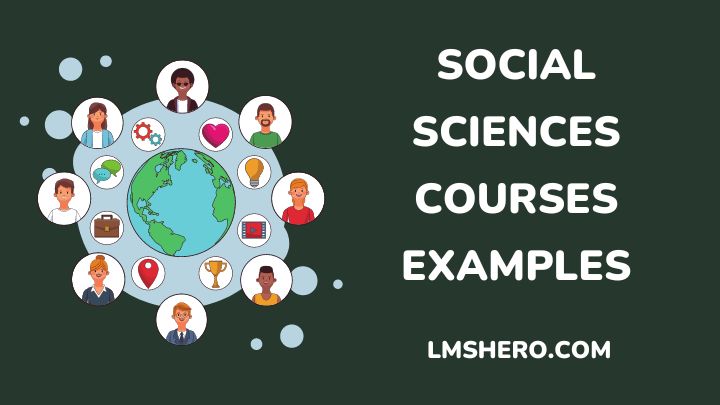Social science concern itself with exploring many facets of society on how people behave, interact, and influence the world. It spans many academic fields, including these social sciences courses examples; psychology, sociology, political science, anthropology, etc.
Social sciences use scientific methods to look into things that happen in society. Whether you just want to learn something new for yourself or you want a get a bachelor’s, master’s, or doctoral degree, there are many course options.
This article explores social science and examples of social sciences courses available across different academic fields.
Read on to learn more.

In simple terms, social science is the study of human society. As a discipline that explores and explains human behavior, social sciences help us in expanding our worldview beyond personal experiences.
In different ways, social sciences can help unearth helpful insights into society, from understanding how the mind works to how societies as a whole function.
It also helps us understand crucial societal functions, such as economic growth and unemployment triggers, as well as what makes people happy.
No matter what your major course of study is, if you take a social sciences class, you can expect to learn about scientific methods and theories. However, most courses in the social sciences are based on research.
Some Social Sciences courses
There are numerous social science courses, hence there are a variety of options for postgraduate study in social science.
Postgraduate students can even choose to pursue a different subject other than their undergraduate major. Because there are several transferable skills and intertwined topics across social science subfields.
The following are examples of social sciences courses:
1. Anthropology
Anthropology, sometimes referred to as the “science of humanity,” aims to explore human experience-related themes. This covers human behavior, cultural ties, and the influence of human evolution on the structure of society.
Anthropology is usually defined as both scientific and humanistic, making it a good choice for those who are interested in both types of study.
2. Archaeology
Archaeology is the study of past human life and behavior as revealed by material relics. And just like anthropology, archaeology investigates past life and societies. However, it focuses more on evidence from material remains.
3. Linguistics
Linguistics is the study of language, which examines how human language is generated, processed, and utilized in various circumstances. Rather than teaching a specific language, this social science course focuses on the operation of language itself.
Linguistics encompasses a vast array of study fields, including syntactic analysis, language acquisition, sociolinguistics, phonology, and the evolution of language.
4. Economics
Basically, economics is the study of the creation, distribution, and consumption of products and services.
While you might have a broad or narrow perspective when studying economics at the graduate level, in general, economics is the study of how the economic systems of the world function.
This knowledge can be used both theoretically and practically, making the course suitable for anybody interested in the contemporary economic environment.
5. Geography
While we mostly attribute geography as that subject that deals with maps, however, it is much more than that.
Geography explores and analyzes population, the land itself, and their relationship, and frequently relates to earth sciences (such as geology).
You can specialize in any geography, such as oceanology, environmental management, or tourism geography, at the graduate level.
6. History
History is a wide social discipline that entails the study of specific times of the past.
Although postgraduate study allows you to specialize in a particular area of history, you will continue to use similar abilities. These include analyzing sources, examining contemporary conceptions of the past, and evaluating ideas against the available evidence.
7. Law

In law, you will have the option to examine a range of legal systems, such as contract law, international law, or criminal law, and can choose to specialize in any one.
Although it is possible to study law merely just for educational purposes, it is also quite beneficial if you intend to make it a profession.
8. Political science
Because politics impacts every aspect of our lives, it is not surprising that it is such a fascinating field of study.
A postgraduate course in political science often consists of political philosophy, comparative politics, international relations, etc. And it allows students to examine both historical and contemporary events.
This degree is ideal for students seeking a career in politics or municipal government, as well as those interested in continuing their education.
10. Psychology
Psychology explores both social behavior and neurobiological processes, which makes it a theoretical and experimental field.
With such a wide field of study — the human mind — you will specialize in specific areas, such as child development, interpersonal connections, social psychology, etc.
11. Sociology
Sociology is the study of society at both the structural and individual levels. It is possible to specialize in a variety of areas, including class, religion, and social mobility, among others.
Some sociologists conduct research merely for theoretical goals, while others attempt to apply their results to policy or social welfare.
FAQs
Is social science related to humanities?
Yes, both humanities and social science explore people, cultures, and societies.
How are social sciences different from humanities?
Humanities hold a subjective, critical-thinking, or opinion-based approach, while social sciences hold an objective approach based on scientific facts.
Conclusion
The job prospects for social scientists are as wide-ranging as the fields themselves. From social workers to anthropologists, psychologists, political scientists, etc., there are opportunities for a variety of occupations.
Some even choose to pursue a Ph.D. and then either teach, conduct research, or enter into private practice, and others earn a bachelor’s degree and then pursue careers in mental health, education, or politics.
With practical coursework in social sciences, students are prepared to work in a variety of people-centered professions. Whatever your area of interest is, there are courses in social sciences available.
Whether you are a busy professional hoping to take a single course or you are considering a full-time program, you will always find courses tailored to match your interests.
I hope you found this article helpful. You can also read some interesting humanities subjects and career opportunities you should know about.






